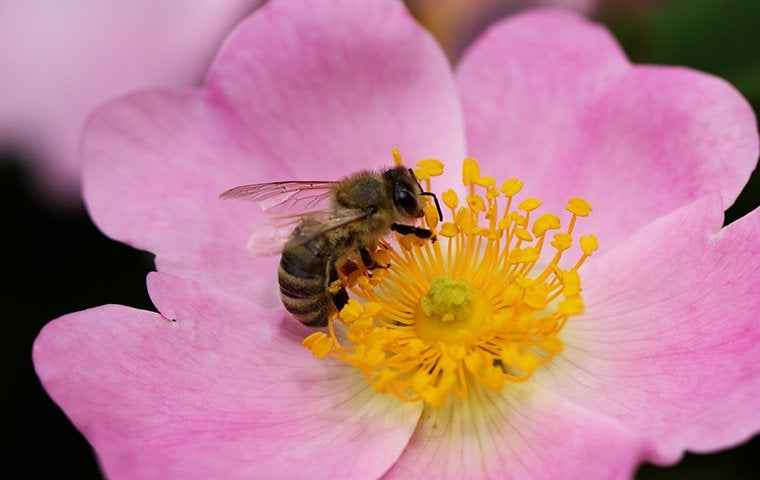There are many benefits to living in the Sunshine State, including great weather year-round, easy access to beaches, and great restaurants. While Jacksonville is no exception, it is also unfortunately home to many unwanted pests. One of the more common pests that Jacksonville pest control companies are called to deal with is the honey bee. One species of bee that is of particular concern to homeowners in Jacksonville, due to the dangers that it poses, is the Africanized honey bee. Here at Trad’s Pest Control, we want to help educate homeowners about how to control Africanized honey bees.
How To Identify Africanized Honey Bees
Africanized honey bees can be hard to differentiate from European honey bees, which are the most common type of honey bee, due to the similarities in appearance. Although they are virtually identical physically, there are a few distinguishing features that can help homeowners identify if their property is infested with Africanized honey bees. Physically, the only way to tell the difference between the two is the size of their bodies; the body of an Africanized honey bee is slightly smaller than that of a typical domestic honey bee.
The behavioral differences of Africanized honey bees compared with European honey bees are easier to identify. Africanized honey bees are more aggressive in their behavior, especially when disturbed or provoked. If an Africanized honey bee colony is disturbed, there will be a larger number of guard bees that will respond and attack compared with European honey bees. Africanized honey bees will also remain agitated for longer periods of time and will chase threats over longer distances, up to a quarter of a mile in certain situations.
Why Africanized Bees Attack And The Dangers Of Their Sting
Africanized honey bees are extremely aggressive and will attack and sting anything that comes within close proximity of their hive or colony. Many homeowners ask why bees sting. These bees are extremely defensive of their nests and colonies and require little to no provocation to attack, will relentlessly chase down any threats, and can reach speeds of up to 15 mph. While a sting from an Africanized bee is no more toxic than that of a European bee, the volume of stings is often much greater. This leads to higher amounts of venom deposited in sting victims and is what makes these bees so dangerous. Potential dangers of being stung by Africanized honey bees include:
- Severe pain
- Vomiting
- Diarrhea
- Nausea
- Kidney, muscle, and liver damage
- Serious complications from an allergic reaction
These dangers make it especially important for homeowners to learn how to control bees in Annapolis. If you think that your home or property is infested with Africanized honey bees, feel free to reach out to Trad’s Pest Control, a Jacksonville pest control company that can help homeowners learn how to control Africanized honey bees.
How To Prevent Africanized Bees From Nesting On Your Property
It is important for homeowners in Annapolis to learn preventive measures and understand how to control Africanized honey bees on their property. There are practical ways for homeowners to defend their property from these dangerous pests and ensure that their home is not an attractive nesting ground. Some of the most effective methods for reducing the chance that Africanized honey bees will nest on your property include:
- Seal any cracks in fencing, foundation, or walls of the property or house.
- Hang mothballs around the yard to repel bees.
- Keep the yard free from waste or other yard debris.
The Pros To Call If You Spot Africanized Honey Bees On Your Property
Despite your best efforts, you may still find yourself faced with an infestation of Africanized honey bees on your property and will need to know who to call for bee removal. If you do find yourself in this unfortunate situation, Trad’s Pest Control is here to solve the problem. Trad’s Pest Control has been serving the greater Jacksonville area for more than 50 years, featuring a team of expertly trained and certified pest technicians and a superior customer service experience. Reach out to us today to receive a free estimate.

